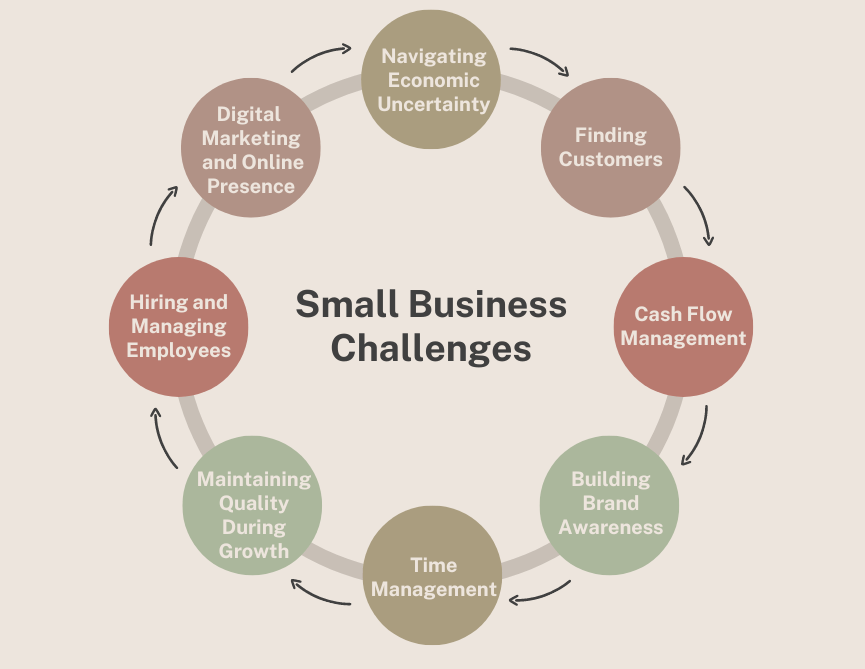Small Business Challenges

Running a small business is like navigating a stormy sea, where unexpected challenges can arise at any moment.
Starting and running a small business has its own unique set of challenges. Being aware of the pitfalls can help business owners cope with the realities of business ownership more effectively. Some of the most common pitfalls small business owners face, along with realistic ways to circumvent them, are outlined below.
Finding Customers
Acquiring the first customers is typically one of the hardest things for small businesses. Unlike established businesses that already have brand recognition and a customer base, new businesses often start from scratch. Most business owners utilize personal connections, i.e., friends and family, to acquire the first customers. However, to bring it to the next level, online credibility and presence are immensely important. Having a professional website, social media presence, and getting customer testimonials can really give a lot of exposure to a business and gain new clients. For example, a new bakery can offer samples at local events and ask happy customers to leave positive reviews online, generating word-of-mouth.
Cash Flow Management
Cash flow is the lifeblood of any company, although for small businesses, it is even more challenging to manage. A majority of startup business owners struggle to maintain a steady revenue stream while balance the bill for expenses. Proper cash flow management entails maintaining a very keen eye on both spending and revenue, invoicing automatically, and maintaining a financial buffer for unexpected costs. Possessing a viable budgetary plan can also ensure the business has sufficient liquidity to operate efficiently. For example, a startup in graphic design may utilize accounting software to monitor revenues and expenses of projects to ensure that they do not overspend.
Building Brand Awareness
Establishing brand awareness is the other significant challenge that small businesses face. Potential customers usually have to see or hear about a brand several times before they can trust it enough to make a purchase. Small businesses can increase their exposure through various strategies such as social media marketing, partnerships with complementary firms, and sponsorship of community events. Consistency in branding and messaging across media reinforces recognition. For example, a fitness club can pair with a nearby health food retailer for joint promotions, which raises their visibility and appeal to consumers who are concerned about their health.
Time Management
Small entrepreneurs perform various role in his business from sales, marketing, product development, to customer service. This can generate time constraints and, eventually, burnout. Effective time management is critical to maintain productivity and work-life balance. Time management can be enhanced by prioritizing tasks, outsourcing tasks, and leveraging project management tools to coordinate activities and help facilitate focus on high-impact activities. For example, a boutique owner can use scheduling software to automate social media updates in order to have more time to focus on customer service.
Maintaining Quality During Growth
Companies, while growing, might find it difficult to maintain consistent quality. Rapid growth may stretch resources, and compromises may be made in product or service quality. To prevent this, it is essential to develop scalable processes that maintain high standards. Owners need to focus on sustainable growth strategies, such as expanding operations incrementally and investing in employee training. A small catering company, for example, could implement quality control checklists and provide ongoing training to enable them to sustain their high standards even while they accept larger events.
Hiring and Managing Employees
It is common for small businesses to find it difficult to hire and retain qualified employees. It could be difficult to find people who fit the company culture and meet operational needs. Effective job descriptions, fair compensation, and a suitable working environment are vital in convincing and keeping quality employees. Investing in employees’ development and offering career development opportunities can enhance employee satisfaction and retention rates. For instance, a technology startup can offer flexible work schedules and staff training programs in order to hire the best minds.
Digital Marketing and Online Presence
With this era of digitization, establishing an online presence is important for small businesses. However, most of them do not use digital marketing suitably due to a lack of skill and limited budgets. Creating a solid digital marketing strategy through social media, email marketing, and SEO would be a good beginning towards serving more clients. It can also enhance its acceptability through acquiring reviews by customers on its websites. For example, a small coffee company might constantly update on new releases and promotions on Instagram and end up with a loyal following of online consumers.
Managing Economic Uncertainty
Economic uncertainty in the form of recessions, inflation, and supply chain disruption can have an immense impact on small businesses. These situations could lead to less consumer spending and increased business costs. To overcome economic uncertainty, small business proprietors must have knowledge of the market trends and make the adjustments required. Maintaining close partnership with suppliers, creating multiple income streams, and flexible business models can build up resilience. A shop, for example, could begin selling products online and provide home delivery to be in a position to access customers even during a recession.
Conclusion
Though it seems that problems in small business are insurmountable, awareness and foreseeing of the problems are the two most essential keys to sustainable success. Proper planning, right marketing, and a mindset to sustain quality must be priorities for entrepreneurs in order to sail through the complexities of running a small business. Preparing ahead by foreseeing such challenges and then taking corrective action timely ensure success and sustainability for small business owners.